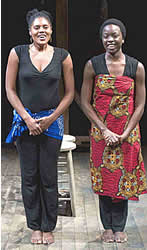|
Back to Index
AIDS
play takes on new subject matter with ‘In the Continuum'
Patrick
Folliard, The Washington Blade
September 08, 2006
http://www.washblade.com/2006/9-8/locallife/theater/aidsplay.cfm
 |
| Nikkole
Salter (left) and Danai Gurira star as two women on different
continents both affected by their HIV diagnosis in Woolly Mammoth's
‘In the Continuum.' (Photo by James Leynse) |
 THE
AIDS PLAY IS a bona fide subgenre of American theater with works
dating back to nearly the beginning of the epidemic with Larry Kramer’s
groundbreaking 1985 drama "The Normal Heart." THE
AIDS PLAY IS a bona fide subgenre of American theater with works
dating back to nearly the beginning of the epidemic with Larry Kramer’s
groundbreaking 1985 drama "The Normal Heart."
In the ’90s,
similarly-themed efforts penned by gay playwrights continued to
command attention, including Tony Kushner’s epic masterpiece "Angels
In America, Parts One and Two," Paul Rudnick’s popular hit
comedy "Jeffrey," and Terrence McNally’s "Love! Valor!
Compassion!"
Over the years,
playwrights and audiences have attempted to make sense of HIV/AIDS,
to react to its horror, place it in a political context, and to
look for hope and meaning beyond its devastation. But as new medicines
appeared on the scene, tempering the immediate threat of the disease
— at least for Manhattan’s middle-class, white gay population who
mostly inhabit these scripts — plays about AIDS sort of disappeared.
Today, black
women represent the highest rates of new HIV infections in both
the United States and Africa. "In the Continuum," a powerful
90-minute tragicomedy written and performed by Danai Gurira and
Nikkole Salter and currently playing at Woolly Mammoth Theatre Company,
addresses that statistic by giving a voice to black women with AIDS
and keeping the AIDS play current.
In a series
of seamlessly interwoven, fascinating vignettes, Gurira and Salter
portray the parallel lives of two young women, Abigail and Nia,
who both learn in the course of a day that they are pregnant and
have contracted HIV from the men they love. Though these intelligent,
endearing characters live in vastly different worlds on separate
continents (one in America, one in Africa) many of their fears and
feelings overlap.
With the unexpected
diagnosis, the women’s worlds are upturned, and both seek to find
support in a shaky personal network of friends and relations including
a witch doctor, stereotypical social worker, snotty high school
acquaintance, opportunistic cousin, unsympathetic mother and more
(all played with revelatory insight by Gurira and Salter).
An educated,
middle-class Zimbabwean woman, Abigail is a bright glimmer in a
discouraging gray sea of poverty and disillusionment. For her, a
visit to the clinic changes everything. If revealed, her newly-discovered
HIV status could cause her to lose her job, husband and son. It’s
a very real possibility that she will be sent back to her rural
village to beg in the dusty streets.
At 19, Nia is
estranged from her family, lives in a homeless shelter for young
women, and was recently fired from a minimum wage job at Nordstrom’s
for stealing. Despite the tired scenario, Nia loves life. She’s
a promising poet who likes to party. Her boyfriend Darnell is a
high school basketball star with a more-than-sunny future.
Unlike Abigail,
for Nia, a positive test result comes with medical care and medication,
but as an unemployed teenage mother-to-be with HIV, she is staring
down a hard road of relative poverty and possibly ostracism from
her peers.
Director Robert
O'Hara gracefully brings the characters’ two worlds together. His
beautifully understated staging carries each character’s inner turmoil
to the forefront.
Like Nia, Salter
is from Los Angeles and Gurira was born and grew up in Zimbabwe.
The pair met at New York University’s graduate acting program, where
they began their collaboration in response to the number of black
women with HIV/AIDS.
As "In
the Continuum" plays out its run in Washington and moves forward
on its national tour, hopefully the population portrayed onstage
will be present in the audience able to share in the experience,
like with productions of AIDS plays before it.
Please credit www.kubatana.net if you make use of material from this website.
This work is licensed under a Creative Commons License unless stated otherwise.
TOP
|

